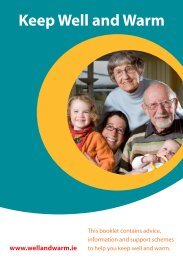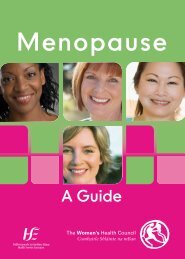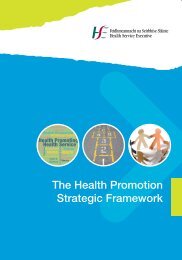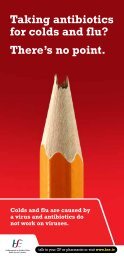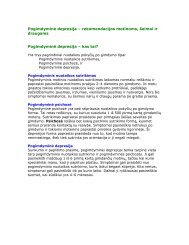Your child's immunisation A guide for parents - Immunise
Your child's immunisation A guide for parents - Immunise
Your child's immunisation A guide for parents - Immunise
Create successful ePaper yourself
Turn your PDF publications into a flip-book with our unique Google optimized e-Paper software.
www.<strong>immunisation</strong>.ie<br />
<strong>Your</strong> child’s<br />
<strong>immunisation</strong><br />
A <strong>guide</strong> <strong>for</strong><br />
<strong>parents</strong>
Childhood<br />
<strong>immunisation</strong> schedule<br />
The table below shows at what age the <strong>immunisation</strong>s are given,<br />
where they are given and which vaccines are given.<br />
All the <strong>immunisation</strong>s listed are free.<br />
AGE WHERE VACCINATION<br />
At Birth<br />
2<br />
Months<br />
4<br />
Months<br />
Hospital or<br />
HSE Clinic<br />
GP Surgery<br />
Visit 1<br />
GP Surgery<br />
Visit 2<br />
BCG<br />
6 in 1<br />
+<br />
PCV<br />
6 in 1<br />
+<br />
Men C<br />
4<br />
5<br />
6<br />
Months<br />
GP Surgery<br />
Visit 3<br />
6 in 1<br />
+<br />
PCV<br />
+<br />
Men C
GP<br />
BCG<br />
General Practitioner<br />
Bacille Calmette-Guerin (TB) vaccine<br />
6 in 1 Diphtheria, Haemophilus influenzae B (Hib), Hepatitis B,<br />
Pertussis (Whooping cough), Polio and Tetanus vaccine<br />
PCV<br />
Men C<br />
MMR<br />
Hib<br />
Pneumococcal conjugate vaccine<br />
Meningococcal C vaccine<br />
Measles, Mumps, Rubella vaccine<br />
Haemophilus influenzae B vaccine<br />
AGE WHERE VACCINATION<br />
12<br />
Months<br />
13<br />
Months<br />
GP Surgery<br />
Visit 4<br />
GP Surgery<br />
Visit 5<br />
MMR<br />
+<br />
PCV<br />
Men C<br />
+<br />
Hib<br />
5 Visits to your GP to be fully vaccinated<br />
<strong>Your</strong> child needs 5 visits to<br />
your GP to be fully vaccinated.<br />
Please remember to bring your<br />
child’s <strong>immunisation</strong> passport<br />
to each visit.
4<br />
Contents<br />
The childhood <strong>immunisation</strong> schedule 6<br />
Be<strong>for</strong>e <strong>immunisation</strong> 6<br />
Can I give my child anything be<strong>for</strong>ehand? 6<br />
What vaccines will my child get at birth? 8<br />
• What can I expect after vaccination? 8<br />
• What happens next? 8<br />
What vaccines will my child get at two months of age? 10<br />
• What can I expect after vaccination? 10<br />
• What happens next? 10<br />
What vaccines will my child get at four months of age? 12<br />
• What can I expect after vaccination? 12<br />
• What happens next? 12<br />
What vaccines will my child get at six months of age? 14<br />
• What can I expect after vaccination? 14<br />
• What happens next? 14<br />
What vaccines will my child get at twelve months of age? 16<br />
• What can I expect after vaccination? 16<br />
• What happens next? 16<br />
What vaccines will my child get at thirteen months of age? 18<br />
• What can I expect after vaccination? 18<br />
Infections and how vaccines protect against them 20<br />
What causes infection? 20<br />
What is a contagious disease? 20<br />
How does my child’s body fight infection? 20<br />
How do vaccines work? 21<br />
How long do vaccines take to work? 21<br />
Why does my child need more than one dose of a vaccine? 21<br />
The schedule explained 22<br />
Why are vaccines given at such an early age? 22<br />
How serious are these diseases? 22<br />
Are too many vaccines given? 22<br />
Will <strong>immunisation</strong>s still work if my child doesn’t get them at the right time? 23<br />
What will happen if my child doesn’t get these vaccines? 24<br />
What are my child’s chances of being exposed to these diseases? 24<br />
Do vaccines always work? 25<br />
1<br />
2<br />
3<br />
4<br />
5
Vaccine contents and safety 26<br />
What is in vaccines? 26<br />
Are vaccines safe? 27<br />
What about the scare stories? 27<br />
Common questions about <strong>immunisation</strong> 28<br />
Are there any reasons to delay <strong>immunisation</strong>? 28<br />
What if my child was premature, had a low birth weight or had jaundice? 28<br />
What if my child has a serious disease? 28<br />
What if my child has asthma, eczema or hay fever? 29<br />
Can my child get the MMR and other vaccines if they are allergic to eggs? 29<br />
What if my child has epilepsy or has had convulsions (fits)? 30<br />
What if my child has recently had, or is due to have, surgery? 30<br />
What if my child has already had one of these diseases? 30<br />
Can my child be immunised while they are in close contact with someone<br />
who is pregnant? 30<br />
Do some children also need other vaccines? 31<br />
5<br />
Common questions after <strong>immunisation</strong> 32<br />
What common reactions can my child get after being vaccinated<br />
and what should I do? 32<br />
What if my child has an allergic reaction to vaccines? 33<br />
What if my child suffers any side effects from vaccines? 33<br />
My child was unwell after the last dose of vaccine. Should they get<br />
the next dose? 33<br />
The diseases and vaccines that protect against them 34<br />
• Diphtheria<br />
• Haemophilus influenza B (Hib)<br />
• Hepatitis B<br />
• Measles<br />
• Meningococcal C (Men C)<br />
• Mumps<br />
• Pertussis (Whooping cough)<br />
• Pneumococcal disease<br />
• Polio<br />
• Rubella (German measles)<br />
• Tetanus<br />
• Tuberculosis (TB)<br />
School vaccination programme 40<br />
Further In<strong>for</strong>mation 41
The childhood<br />
<strong>immunisation</strong> schedule<br />
In Ireland, all the recommended <strong>immunisation</strong>s listed in the<br />
primary childhood <strong>immunisation</strong> schedule are free.<br />
REMEMBER your child needs FIVE visits to your GP to complete<br />
their course of vaccines and be fully protected against serious<br />
diseases.<br />
6<br />
Be<strong>for</strong>e <strong>immunisation</strong><br />
Be<strong>for</strong>e your child is immunised, the doctor or nurse will check with you<br />
that your child is well and able to get the vaccines. If you have any worries<br />
or questions about your child’s <strong>immunisation</strong>s, ask the doctor or nurse<br />
be<strong>for</strong>e your child is immunised. You can also ask <strong>for</strong> further in<strong>for</strong>mation<br />
from your public health nurse at your local HSE clinic.<br />
There are very few reasons why your child should not get a vaccine.<br />
If you are not sure about something you should talk to the doctor or nurse<br />
be<strong>for</strong>e your child is immunised.<br />
Can I give my child anything be<strong>for</strong>ehand?<br />
You can give your child a sugar based drink a few minutes be<strong>for</strong>e their<br />
vaccination. This has been shown to help to reduce pain at the injection<br />
site.<br />
Do not give any pain relieving medicine to your child be<strong>for</strong>e they get their<br />
vaccines as this has been shown to reduce the effectiveness of<br />
some vaccines. These medicines should only be used if your<br />
child has a high fever (over 39.5˚C) after vaccination.
REMEMBER<br />
FIVE visits to your GP<br />
1345 2<br />
7
Birth<br />
What vaccines will my child get at birth?<br />
When your child is born, a Health Service Executive (HSE) doctor will give<br />
your child the BCG vaccine at the maternity hospital or later at<br />
a HSE clinic. This vaccine protects against Tuberculosis (TB).<br />
This vaccine is given in the left arm.<br />
What can I expect after vaccination?<br />
Three to six weeks after the BCG vaccine, a small red pimple usually<br />
appears at the site of the injection. The pimple will remain <strong>for</strong> a number<br />
of weeks and there may be a slight discharge. A scab may <strong>for</strong>m over the<br />
injection site. This is normal. The scab will heal and leave a small scar.<br />
If you are worried about your child, please contact your public health nurse<br />
<strong>for</strong> advice.<br />
8<br />
If your child does not get the BCG vaccine at birth you should make an<br />
appointment to attend your local HSE clinic. <strong>Your</strong> public health nurse will<br />
tell you how to do this.<br />
What happens next?<br />
The HSE will write to tell you to arrange to visit your GP <strong>for</strong> the<br />
<strong>immunisation</strong>s. If you do not hear from the HSE, you should arrange to<br />
visit your GP when your child is two months old.<br />
REMEMBER your child needs FIVE visits to your GP to<br />
complete their course of vaccines and be fully protected<br />
against serious diseases. Please remember to bring your<br />
child’s <strong>immunisation</strong> passport <strong>for</strong> their next visit.<br />
At Birth 2 Months 4 Months
6 Months 12 Months 13 Months<br />
9
2 Months<br />
The HSE will write to tell you to arrange to visit your GP <strong>for</strong> the<br />
<strong>immunisation</strong>s. If you do not hear from the HSE, you should arrange to<br />
visit your GP when your child is two months old.<br />
What vaccines will my child get at two months of age?<br />
When your child is two months of age they will get two vaccines:<br />
• the 6 in 1 vaccine to protect against diphtheria, haemophilus<br />
influenzae B (Hib), hepatitis B, pertussis (whooping cough), polio<br />
and tetanus; and<br />
• the PCV vaccine to protect against pneumococcal disease.<br />
The vaccines are given in your child’s legs – one in the right leg and one<br />
in the left leg.<br />
10<br />
What can I expect after vaccination?<br />
<strong>Your</strong> child may have a sore leg or fever after vaccination. If they have<br />
a very high fever over 39.5˚C you can give them plenty of fluids and<br />
paracetamol or ibuprofen. Please see page 32 <strong>for</strong> further advice.<br />
If you are worried about your child, please contact your GP, practice nurse<br />
or public health nurse <strong>for</strong> further advice.<br />
What happens next?<br />
When your child has received their vaccines at two months you should<br />
make an appointment with your GP <strong>for</strong> your child’s four month vaccines.<br />
You should also place a reminder in your phone or write the date of your<br />
child’s next appointment on a calendar.<br />
At Birth 2 Months 4 Months
1<br />
Visit<br />
11<br />
REMEMBER your child needs FOUR more visits to your GP<br />
to complete their course of vaccines and be fully protected<br />
against serious diseases. Please remember to bring your child’s<br />
<strong>immunisation</strong> passport <strong>for</strong> their next visit.<br />
6 Months 12 Months 13 Months
4 Months<br />
What vaccines will my child get at four months of age?<br />
When your child is four months of age they will get two vaccines:<br />
• the 6 in 1 vaccine (this is the same vaccine that your child got when<br />
they were two months of age); and<br />
• the Men C vaccine to protect against meningococcal C disease.<br />
The vaccines are given in your child’s legs – one in the right leg and one<br />
in the left leg.<br />
12<br />
What can I expect after vaccination?<br />
<strong>Your</strong> child may have a sore leg or fever after vaccination. If they have<br />
a very high fever over 39.5˚C you can give them plenty of fluids and<br />
paracetamol or ibuprofen. Please see page 32 <strong>for</strong> further advice.<br />
If you are worried about your child, please contact your GP, practice nurse<br />
or public health nurse <strong>for</strong> further advice.<br />
What happens next?<br />
When your child has received their vaccines at four months you should<br />
make an appointment with your GP to attend <strong>for</strong> your child’s six month<br />
vaccines. You should also place a reminder in your phone or write the date<br />
of your child’s next appointment on a calendar.<br />
At Birth 2 Months 4 Months
Visit2<br />
13<br />
REMEMBER your child needs THREE more visits to your GP<br />
to complete their course of vaccines and be fully protected<br />
against serious diseases. Please remember to bring your child’s<br />
<strong>immunisation</strong> passport <strong>for</strong> their next visit.<br />
6 Months 12 Months 13 Months
6 Months<br />
What vaccines will my child get at six months of age?<br />
When your child is six months of age they will get three vaccines:<br />
• the 6 in 1 vaccine (this is the same vaccine that your child got when<br />
they were two months and four months old);<br />
• the PCV vaccine (this is the same vaccine that your child got when<br />
they were two months old); and<br />
• the Men C vaccine (this is the same vaccine that your child got when<br />
they were four months old).<br />
The vaccines are given in your child’s legs – two vaccines are given in one<br />
leg and one vaccine in the other leg.<br />
14<br />
What can I expect after vaccination?<br />
<strong>Your</strong> child may have a sore leg or fever after vaccination. If they have<br />
a very high fever over 39.5˚C you can give them plenty of fluids and<br />
paracetamol or ibuprofen. Please see page 32 <strong>for</strong> further advice.<br />
If you are worried about your child, please contact your GP, practice nurse<br />
or public health nurse <strong>for</strong> further advice.<br />
What happens next?<br />
When your child has received their vaccines at six months you should<br />
make an appointment with your GP to attend <strong>for</strong> your child’s twelve month<br />
vaccines. You should also place a reminder in your phone or write the date<br />
of your child’s next appointment on a calendar.<br />
The HSE will send you a letter to tell you about the vaccines that your<br />
child should receive at twelve and thirteen months.<br />
At Birth 2 Months 4 Months
Visit3<br />
15<br />
REMEMBER your child needs TWO more visits to your GP<br />
to complete their course of vaccines and be fully protected<br />
against serious diseases. Please remember to bring your child’s<br />
<strong>immunisation</strong> passport <strong>for</strong> their next visit.<br />
6 Months 12 Months 13 Months
12 Months<br />
The HSE will write to tell you about the vaccines that your child should<br />
receive at twelve and thirteen months. You should arrange to visit your<br />
GP <strong>for</strong> the <strong>immunisation</strong>s. If you do not hear from the HSE you should<br />
arrange to visit your GP when your child is twelve months old.<br />
What vaccines will my child get at twelve months of age?<br />
When your child is twelve months old they will get two vaccines:<br />
• the PCV booster (this is the same vaccine that your child got when<br />
they were two months and six months of age); and<br />
• the MMR vaccine to protect against measles, mumps and rubella.<br />
These vaccines can be given in either the arm or the leg.<br />
16<br />
What can I expect after vaccination?<br />
<strong>Your</strong> child may have a sore arm or leg or fever after vaccination.<br />
<strong>Your</strong> child may have a mild rash with fever (mini-measles) 6-10 days after<br />
vaccination. This is not contagious.<br />
<strong>Your</strong> child may get swelling of their salivary glands under the jaw<br />
(mini-mumps) three weeks after vaccination. This is not contagious.<br />
If they have a very high fever over 39.5˚C you can give them plenty of<br />
fluids and paracetamol or ibuprofen. Please see page 32 <strong>for</strong> further advice.<br />
If you are worried about your child please contact your GP, practice nurse<br />
or public health nurse <strong>for</strong> further advice.<br />
What happens next?<br />
When your child has received their vaccines at twelve months you should<br />
make an appointment with your GP to attend <strong>for</strong> your child’s thirteen<br />
month vaccines. You should also place a reminder in your phone or write<br />
the date of your child’s next appointment on a calendar.<br />
At Birth 2 Months 4 Months
Visit<br />
4<br />
17<br />
REMEMBER your child needs ONE more visit to your GP<br />
to complete their course of vaccines and be fully protected<br />
against serious diseases. Please remember to bring your child’s<br />
<strong>immunisation</strong> passport <strong>for</strong> their next visit.<br />
6 Months 12 Months 13 Months
13 Months<br />
What vaccines will my child get at thirteen months of age?<br />
When your child is thirteen months old they will get two vaccines:<br />
• the Men C booster vaccine (this is the same vaccine that your child got<br />
when they were four and six months of age); and<br />
• the Hib booster vaccine (your child got this vaccine previously<br />
as one of the components of the 6 in 1 vaccine).<br />
These vaccines can be given in either the arm or the leg.<br />
What can I expect after vaccination?<br />
<strong>Your</strong> child may have a sore arm or leg or fever after vaccination. If they<br />
have a very high fever over 39.5˚C you can give them plenty of fluids and<br />
paracetamol or ibuprofen. Please see page 32 <strong>for</strong> further advice.<br />
18<br />
If you are worried about your child please contact your GP, practice nurse<br />
or public health nurse <strong>for</strong> further advice.<br />
At Birth 2 Months 4 Months
Visit<br />
5<br />
19<br />
<strong>Your</strong> child has now completed the childhood schedule and does<br />
not need any more vaccines until they are 4-5 years old. Keep<br />
your child’s <strong>immunisation</strong> passport safe <strong>for</strong> future vaccinations.<br />
6 Months 12 Months 13 Months
Infections and how<br />
vaccines protect against<br />
them<br />
Immunisation is a simple, safe and effective way of protecting<br />
your child against certain diseases. The risks from having these<br />
diseases are much greater than the risk of any minor side effects<br />
from <strong>immunisation</strong>.<br />
What causes infection?<br />
Infections are caused by germs entering the body through cuts or by<br />
being breathed in or swallowed. The germs then cause diseases such as<br />
meningitis (infection of the lining around the brain), pneumonia (a lung<br />
infection) or septicaemia (blood poisoning).<br />
20<br />
What is a contagious disease?<br />
A contagious disease is one that spreads from one person (someone<br />
who is infected or is a ‘carrier’) to another through coughs and sneezes.<br />
Carriers are people who ‘carry’ germs in their body but are not sick<br />
themselves. For example, 1 in 10 people carry meningococcal germs<br />
but only 1 in 10,000 gets sick with meningitis or septicaemia from those<br />
germs.<br />
How does my child’s body fight infection?<br />
When germs infect your child’s body, your child’s immune system makes<br />
‘antibodies’. Antibodies do the following two things:<br />
• Their first job is to attack and destroy the germs. However, because<br />
it takes the body time to make enough antibodies, the germs may<br />
damage your child’s body be<strong>for</strong>e the antibodies can destroy them.<br />
• Their second job is to stay in your child’s body to protect them against<br />
future infections. If the same germs try to infect your child again, the<br />
antibodies will destroy the germs be<strong>for</strong>e they have a chance to make<br />
your child sick. This way of dealing with germs is called ‘immunity’.
It is why most people get diseases like measles or chickenpox only<br />
once, even though they might be exposed to them many times.<br />
The problem with getting natural immunity from germs is that your child<br />
has to get sick be<strong>for</strong>e they develop immunity. In fact, some germs<br />
could make your child very sick or even kill them be<strong>for</strong>e their<br />
body could produce enough antibodies to destroy the germs.<br />
How do vaccines work?<br />
When your child is given a vaccine, their body responds by making<br />
antibodies, the same as if they had caught the disease but without<br />
getting sick. Their body then produces antibodies to destroy the vaccine<br />
and these stay in your child’s body and protect them against the actual<br />
disease.<br />
21<br />
How long do vaccines take to work?<br />
It usually takes a few weeks <strong>for</strong> vaccines to work, so your child will not be<br />
protected immediately. Also, most vaccines need to be given several times<br />
to build up long-lasting protection. For example, a child who gets only<br />
one or two doses of the whooping cough vaccine is only partly protected<br />
against that disease and may still catch whooping cough.<br />
Why does my child need more than one dose of a vaccine?<br />
More than one dose of the same vaccine is given in the first few years<br />
of a child’s life. The extra doses improve the antibody<br />
response and give better long term protection.<br />
Booster doses of some vaccines are also given<br />
to school children to give better long term<br />
protection.
The schedule explained<br />
Why are vaccines given at such an early age?<br />
Vaccines are given at an early age because young babies are most<br />
vulnerable to these diseases and need to be protected as early as<br />
possible. For example, babies younger than 6 months are at the highest<br />
risk <strong>for</strong> serious complications of pertussis (6 out of 10 need to go into<br />
hospital, and 9 out of 10 deaths from whooping cough are in this age<br />
group). The MMR vaccine is not usually recommended <strong>for</strong> children under<br />
12 months because it may not work properly.<br />
22<br />
How serious are these diseases?<br />
Any of them can kill a child or an adult. It’s easy to <strong>for</strong>get how serious they<br />
are because – thanks largely to vaccines – we don’t see them nearly as<br />
much as we used to.<br />
Measles used to kill thousands of people in Europe and the United States<br />
every year. In the 1940s and 1950s, tens of thousands of children were<br />
crippled or killed by polio. As recently as the mid 1980s, 100 children<br />
a year in Ireland suffered from meningitis and other serious complications<br />
as a result of Hib infection.<br />
These diseases have not changed. They can still cause pneumonia,<br />
choking, meningitis, brain damage and heart problems in children who are<br />
not protected. These diseases still kill children in many parts of the world,<br />
even in Ireland.<br />
Are too many vaccines given?<br />
Some <strong>parents</strong> worry that giving several vaccines at once will overload<br />
their child’s immune system or that the vaccines may not work properly.<br />
However, there is nothing to worry about as your child’s immune system<br />
can easily cope with vaccines. Studies have shown that vaccines are just
as safe and just as effective when they are given together as when they<br />
are given separately. For example, if your child received single injections<br />
instead of the combined MMR vaccine, they would be exposed to the<br />
diseases of measles, mumps or rubella <strong>for</strong> a longer period and would have<br />
to have six injections instead of two.<br />
A number of injections are needed to give your child the fullest possible<br />
protection, so it is important to complete the course. The number of<br />
injections is reduced by the use of combination vaccines where several<br />
vaccines are combined into one injection.<br />
The ages at which vaccines are recommended are chosen to give your<br />
child the earliest and best protection against disease.<br />
23<br />
Will <strong>immunisation</strong>s still work if my child doesn’t get them at the<br />
right time?<br />
Yes. Most of these vaccines can be given at any age, and a child who<br />
misses one injection in a course of injections does not have to start again.<br />
The vaccines already given will still work and your child will still develop<br />
protection. Just ask your GP.<br />
<strong>Your</strong> child needs to get the vaccines at the right age so that they<br />
are protected from serious diseases when they are<br />
most vulnerable.<br />
GET THE VACCINES ON TIME EVERY TIME
24<br />
What will happen if my child doesn’t get these vaccines?<br />
Basically, one of two things could happen:<br />
• If your child goes through life without ever being exposed to these<br />
diseases, nothing would happen.<br />
• If your child is exposed to any of these diseases, as a child or as an<br />
adult, there is a good chance that he or she will get the disease.<br />
<strong>Your</strong> child could<br />
- get mildly ill and have to stay inside <strong>for</strong> a few days; or<br />
- get very sick and have to go into hospital or at worst die.<br />
<strong>Your</strong> child could also spread those diseases to others who are not<br />
protected, such as children who are too young to be vaccinated. Many<br />
people could get very sick and some could die if not enough people in<br />
your community are protected.<br />
What are my child’s chances of being exposed to these<br />
diseases?<br />
Some of these diseases are very rare in Ireland today, so the chances<br />
of exposure are small, but others are still fairly common. Some of the<br />
diseases are rare in Ireland but common elsewhere in the world, so your<br />
child could get those diseases while travelling abroad.<br />
You shouldn’t assume your child is completely safe from diseases, even<br />
the rare ones. Diphtheria still occurs in some Asian countries. In 2010<br />
a large polio epidemic took place in Eastern Europe. Polio still occurs in<br />
Pakistan, Nigeria, India and Afghanistan.<br />
With increased travel to and from these countries, it is possible that<br />
these diseases will become more common. If enough people don’t get<br />
immunised, epidemics will definitely follow.
If your child is not immunised, they are at a greater risk of getting these<br />
infections when they are older. Some infections are more serious in<br />
teenagers or adults than in children. For example, mumps in teenage<br />
boys or young men may cause swelling of the testicles and if a woman<br />
catches rubella during the early stages of pregnancy, this may cause<br />
major birth defects in the baby. Measles can be more serious in adults.<br />
Do vaccines always work?<br />
Vaccines work most of the time, but not always. Most childhood<br />
<strong>immunisation</strong>s protect 90% to 99% of the children who get them,<br />
but sometimes a child will not respond to certain vaccines.<br />
This is another reason why it’s important <strong>for</strong> all children<br />
to be immunised. A child who has not responded to<br />
<strong>immunisation</strong> depends on the immunity of others around<br />
them <strong>for</strong> protection. <strong>Your</strong> child could be infected by a child<br />
who hasn’t been immunised, but not by one who is immune.<br />
Effectiveness of Vaccines<br />
25<br />
Vaccine<br />
BCG vaccine<br />
Diphtheria vaccine<br />
Hepatitis B vaccine<br />
Hib vaccine<br />
MMR vaccine<br />
Men C vaccine<br />
Pertussis (whooping cough) vaccine<br />
Pneumococcal vaccine (PCV)<br />
Polio vaccine<br />
Tetanus vaccine<br />
Percentage of children immune<br />
after getting the recommended<br />
doses of vaccine<br />
Up to 80%<br />
95%<br />
98%<br />
95 to 100%<br />
95%<br />
90%<br />
80 to 85%<br />
90%<br />
99%<br />
Almost 100%
In a school of 1,000<br />
NO MMR vaccine<br />
• 1,000 cases of measles • 50 cases of measles<br />
• 40 children get pneumonia<br />
• 50 children get an<br />
ear infection<br />
• 1-2 children die<br />
Vaccinated with MMR<br />
• 2 children get pneumonia<br />
• 2-3 children get<br />
an ear infection<br />
Vaccine contents & safety<br />
26<br />
What is in vaccines?<br />
Vaccines contain active ingredients (the vaccine itself) and additives such<br />
as preservatives and stabilisers.<br />
Active ingredients<br />
Vaccines are made from the same germs that cause infections, but the<br />
germs in vaccines are either killed or weakened so that they won’t make<br />
your child sick and are safe to use.<br />
Additives<br />
Vaccines may contain:<br />
• a small amount of preservative to protect the vaccine from<br />
contamination<br />
• other additives to make sure that the active vaccine ingredient<br />
is evenly mixed throughout the injection mixture and<br />
• a small amount of aluminium salt, which helps the body to<br />
respond better to the vaccine.<br />
The level of additives in vaccines is very low and within internationally<br />
recommended levels. These additives do not cause any serious health<br />
problems in babies and young children.
Are vaccines safe?<br />
The vaccines used in Ireland are safe. All medicines can cause side<br />
effects, but with vaccines these are usually mild, like a sore arm or leg or<br />
a slight fever. Serious side effects to vaccines are extremely rare.<br />
Research from around the world shows that <strong>immunisation</strong> is the safest<br />
way to protect your child’s health. <strong>Your</strong> doctor or nurse can discuss the<br />
risks with you be<strong>for</strong>e giving your child their vaccines.<br />
All the recommended vaccines used to protect children in Ireland<br />
are licensed by the Irish Medicines Board or the European<br />
Medicines Agency. They are allowed to be used only after they<br />
have been shown to be both effective and safe.<br />
What about the scare stories?<br />
We know that vaccines don’t cause autism, diabetes, multiple sclerosis,<br />
allergies, asthma or attention deficit disorder (commonly known as<br />
hyperactivity). However, when things happen to our children around the<br />
same time as they are immunised we can wrongly presume that there<br />
is a link. For example, the signs of autism usually become noticeable at<br />
about the age when children are given the MMR vaccine, but one does<br />
not cause the other. Because most children get immunised, those who<br />
have conditions such as autism, asthma or attention deficit disorder will<br />
probably have been immunised as well. Studies to see if children who have<br />
been immunised are more likely to have these conditions have shown that<br />
there is no link between the conditions and vaccines.<br />
27<br />
Extensive research into the MMR vaccine, involving thousands of children,<br />
was carried out in the UK, the USA, Sweden and Finland. This research<br />
showed that there is no link between MMR and autism. One study looked<br />
at every child born in Denmark from 1991 to 1998. During that time, 82%<br />
of children born in Denmark received the MMR vaccine. The researchers<br />
looked at the records of over half a million children and found the risk<br />
of autism was the same in immunised children as in children who had<br />
not been immunised. Experts from around the world, including the World<br />
Health Organization, agree that there is no link between MMR and autism.
Common questions about<br />
<strong>immunisation</strong><br />
Are there any reasons to delay <strong>immunisation</strong>?<br />
There are very few medical reasons to delay <strong>immunisation</strong>. If your child<br />
has a high temperature, the <strong>immunisation</strong> should be put off until your child<br />
is better. However, babies and children with minor coughs and colds, or<br />
those on antibiotics, can be immunised safely and effectively.<br />
If you are worried about whether your child is fit to be<br />
immunised, talk to the doctor or nurse be<strong>for</strong>e putting off the<br />
<strong>immunisation</strong>.<br />
28<br />
What if my child was premature, had a low birth weight or had<br />
jaundice?<br />
It is important that premature babies are protected because they are more<br />
vulnerable to certain infections. In general, premature babies should be<br />
immunised as normal. If your child had a very low birth weight, you should<br />
discuss their <strong>immunisation</strong> needs with your paediatrician. Babies who had<br />
jaundice after being born and those who are being breast-fed should be<br />
immunised as normal.<br />
What if my child has a serious disease?<br />
It is very important that children with serious diseases are immunised<br />
because they are often more at risk from complications of infections.<br />
Children with stable neurological conditions such as cerebral palsy or<br />
Down syndrome should be immunised as normal.<br />
However, care is needed if the child’s illness, or its treatment, may<br />
lower their immunity. Immunisation should be carefully considered <strong>for</strong><br />
children with cancer or an immune deficiency disorder, or who are taking<br />
medicines which may reduce their ability to fight infection. Discuss this<br />
with your doctor.
Children who have had a blood transfusion or received blood products<br />
should not get their MMR vaccine until three months after the<br />
transfusion.<br />
What if my child has asthma, eczema or hay fever?<br />
Children with asthma, eczema, hay fever and allergies should be<br />
immunised, even if they have a severe allergy to eggs (<strong>for</strong> example,<br />
hives (red itchy bumps), swelling of the mouth or throat, difficulty<br />
breathing, wheezing, low blood pressure and shock).<br />
Children taking steroids by inhaler or in a low-dose steroid cream should<br />
be immunised as normal. If you have any doubts, talk to the doctor or<br />
nurse giving the <strong>immunisation</strong>.<br />
29<br />
Can my child get the MMR and other vaccines if they are<br />
allergic to eggs?<br />
In the past it was believed that children who were allergic to eggs could<br />
not get the MMR vaccine. The MMR vaccine can be given to children<br />
with an egg allergy. <strong>Your</strong> child simply disliking eggs or having diarrhoea<br />
or stomach pains after eating eggs is not a reason to avoid the MMR<br />
<strong>immunisation</strong>, and you do not need to take any special precautions.<br />
If you have any doubts, talk to the doctor or nurse giving the<br />
<strong>immunisation</strong>.<br />
Flu vaccine should not be given to those who have a severe allergy<br />
to eggs.
What if my child has epilepsy or has had convulsions (fits)?<br />
These children should still be immunised if their condition is stable.<br />
Some children get fits (febrile convulsions) if they have a high<br />
temperature or a fever. If they get a high fever (over 39.5˚C) after they<br />
have been vaccinated give them paracetamol or ibuprofen.<br />
Children with a family history of fits or epilepsy should be immunised as<br />
normal.<br />
What if my child has recently had, or is due to have, surgery?<br />
Do not put the <strong>immunisation</strong> off if your child is due to have an operation<br />
or has recently had one. Having surgery is not a reason to put off<br />
<strong>immunisation</strong>, and a recent <strong>immunisation</strong> is not a reason to put off surgery.<br />
30<br />
What if my child has already had one of these diseases?<br />
You should still immunise your child against these diseases, even if they<br />
have had them. It is important to be protected against all the diseases the<br />
vaccine covers, even if the child has caught one of the diseases be<strong>for</strong>e.<br />
This is very important as children under two years do not get enough<br />
natural immunity following illness with Hib, Men C or pneumococcal<br />
disease and so should still be immunised.<br />
Can my child be immunised while they are in close<br />
contact with someone who is pregnant?<br />
Yes. There is no problem with giving routine <strong>immunisation</strong>s to<br />
a child who is in close contact with someone who is pregnant.<br />
In fact, immunising the child will protect the mother from<br />
being exposed to diseases like rubella.
Do some children also need other vaccines?<br />
Yes. Children who have had their spleens removed or have cystic<br />
fibrosis, an immune deficiency, chronic heart, lung, liver or kidney<br />
disease, sickle cell disease or diseases such as diabetes are more<br />
vulnerable to some infections. If your child has any long-term illness, ask<br />
your doctor if they need to be immunised against diseases like flu or<br />
hepatitis A.<br />
If you are travelling to another country, remember to find out if your child<br />
needs any special vaccines.<br />
Immunisation against infectious disease has saved more lives<br />
than any other public health intervention apart from providing<br />
clean water.<br />
31
Common questions after<br />
<strong>immunisation</strong><br />
What common reactions can my child get after being vaccinated<br />
and what should I do?<br />
Common Reaction<br />
Soreness, swelling and redness<br />
in the area where the injection<br />
was given<br />
Fever (over 39.5˚C)<br />
Headache or irritability<br />
What to do<br />
• Give paracetamol or ibuprofen<br />
to relieve aches and pains<br />
A• Do not overdress your baby<br />
• Make sure clothes are not too tight<br />
or rubbing against the area where<br />
the injection was given<br />
• Make sure their room isn’t too hot<br />
• Give extra fluids to drink<br />
• Give paracetamol or ibuprofen to<br />
lower the fever<br />
• Give paracetamol or ibuprofen to<br />
relieve aches and pains<br />
32<br />
Remember, if your child is very unwell after getting a vaccine,<br />
they may be sick <strong>for</strong> some other reason. Talk to your GP about<br />
this.<br />
Children do NOT usually need to take any medicine when they are given<br />
a vaccine. However, if your child gets a fever (over 39.5˚C) or is sore<br />
where the injection was given, you may give them paracetamol or<br />
ibuprofen.<br />
Remember, after having the MMR vaccine a fever may happen about 6 to<br />
10 days later, so give paracetamol or ibuprofen then.<br />
The dose of paracetamol or ibuprofen recommended <strong>for</strong> your child<br />
is written on the bottle according to the child’s age.<br />
Please ask your pharmacist <strong>for</strong> sugar-free mixture of paracetamol or<br />
ibuprofen suitable <strong>for</strong> your child’s age.<br />
Using paracetamol or ibuprofen over a long period without<br />
advice from a doctor may be harmful.
What if my child has an allergic reaction to vaccines?<br />
Serious allergic reactions to vaccines are extremely rare. About one<br />
person out of one million may have a serious allergic reaction. Signs<br />
of a serious allergic reaction include difficulty breathing, hoarseness,<br />
wheezing, hives, paleness, weakness, a fast heartbeat, dizziness and<br />
swelling of the throat. If the reaction is treated quickly, the child will<br />
recover fully. Doctors and nurses who give <strong>immunisation</strong>s are trained to<br />
deal with allergic reactions.<br />
What if my child suffers any side effects from vaccines?<br />
Most side effects from vaccines are limited to tenderness and swelling<br />
or pain where the injection was given or a fever. Children usually recover<br />
from these minor side effects within a day or two. Most of these minor<br />
side effects happen in the first day or two after <strong>immunisation</strong>. However,<br />
after the MMR vaccine, some children may get a fever or a rash 6 to 10<br />
days later (mini measles). This is not contagious.<br />
The Irish Medicines Board monitors all reported side effects of vaccines.<br />
This also happens in other countries so that new and rare side effects<br />
can be detected quickly and any necessary action taken.<br />
If your child has any side effects after <strong>immunisation</strong>, let your GP know<br />
so that he or she can report it to the Irish Medicines Board.<br />
33<br />
My child was unwell after the last dose of vaccine. Should they<br />
get the next dose?<br />
Some children may be unwell after their <strong>immunisation</strong>. Usually there<br />
is no reason not to finish the course of vaccine. However, if your child<br />
had a severe allergic reaction (that is, shock or difficulty breathing), they<br />
should not get that vaccine again until you know why this happened. In<br />
this situation, talk to the doctor about the reaction.
34<br />
The diseases and the vaccines<br />
that protect against them<br />
The table on the next few pages sets out:<br />
• the description of the diseases<br />
• the effects of the disease and<br />
• the possible side effects of the vaccine<br />
Disease<br />
Effects of disease<br />
Side effects of<br />
vaccine<br />
Diphtheria – contagious<br />
bacteria that spread<br />
by close contact with an<br />
infected person or carrier<br />
and cause a sore throat and<br />
severe breathing difficulties<br />
Haemophilus<br />
influenzae B (Hib) –<br />
- contagious bacteria<br />
that spread by close<br />
contact with an infected<br />
person and cause meningitis<br />
(inflammation of the lining<br />
around the brain), epiglottitis<br />
(swelling in the throat that<br />
causes choking), septicaemia<br />
(blood poisoning) and<br />
osteomyeltitis (infection of the<br />
bone).<br />
Of the people who get<br />
diphtheria:<br />
• 1 in 15 will die.<br />
• The bacteria release a toxin<br />
(poison) which can lead to<br />
paralysis and heart failure.<br />
Of the people who get Hib<br />
disease:<br />
• 1 in 20 people who have<br />
Hib meningitis will die;<br />
• 1 in 4 people who recover<br />
from Hib meningitis will<br />
have permanent brain<br />
damage or deafness; and<br />
• 1 in 100 people who have<br />
epiglottitis (swelling in the<br />
throat that causes choking)<br />
will die.<br />
Of the people who are<br />
immunised:<br />
• 1 in 10 have redness and<br />
swelling where the injection<br />
was given or have a fever.<br />
Serious side effects are very<br />
rare.<br />
Of the people who are<br />
immunised:<br />
• 1 in 5 have discom<strong>for</strong>t,<br />
redness or swelling where<br />
the injection was given; and<br />
• 1 in 50 will have a fever.<br />
Hepatitis B – a contagious<br />
virus that is spread by contact<br />
with the blood or other body<br />
fluid of an infected person<br />
and causes liver disease.<br />
Children have a higher risk of<br />
having hepatitis B infection<br />
<strong>for</strong> life.<br />
Of those who have<br />
hepatitis B infection <strong>for</strong> life<br />
• 1 in 4 will die from scarring<br />
of the liver (cirrhosis) or<br />
liver cancer.<br />
Of the people who are<br />
immunised:<br />
• 1 in 10 have discom<strong>for</strong>t,<br />
redness or swelling where<br />
the injection was given, or<br />
will have a fever<br />
Serious side effects are very<br />
rare.
35<br />
Disease<br />
Effects of disease<br />
Side effects of<br />
vaccine<br />
Measles – a highly<br />
contagious virus that is<br />
spread by close contact<br />
with an infected person and<br />
causes fever, a cough and a<br />
rash.<br />
Of the people who get<br />
measles:<br />
• 1 or 2 in 1,000 will die;<br />
• 1 in 20 will get an ear<br />
infection;<br />
• 1 in 25 will get pneumonia<br />
or bronchitis;<br />
• 1 in 200 will have<br />
convulsions (fits); and<br />
• 1 in 6 will get diarrhoea.<br />
• 1 in 1,000 will develop<br />
encephalitis (inflammation<br />
of the brain). For every 10<br />
children who develop<br />
encephalitis:<br />
• 1 will die; and<br />
• up to 4 will have brain<br />
damage.<br />
• 1 in 8,000 children under<br />
two years of age get SSPE<br />
(brain degeneration), which<br />
may be many years after<br />
measles and is always fatal.<br />
• 1 in 6,000 will get a blood<br />
clotting problem<br />
Of the people who are<br />
immunised:<br />
• 1 in 10 will have<br />
discom<strong>for</strong>t, redness or<br />
swelling where the<br />
injection was given, or will<br />
have a fever;<br />
• 1 in 20 will get a rash six<br />
to ten days later (this is not<br />
contagious);<br />
• 1 in 1,000 will have a<br />
convulsion (fit);<br />
• 1 in a million may develop<br />
encephalitis (inflammation<br />
of the brain);<br />
• 1 in 22,000 will get a<br />
temporary blood clotting<br />
problem
The diseases and the vaccines<br />
that protect against them<br />
36<br />
• the description of the diseases<br />
• the effects of the disease and<br />
• the possible side effects of the vaccine<br />
Disease<br />
Effects of disease<br />
Side effects of<br />
vaccine<br />
Meningococcal C (Men C)<br />
– contagious bacteria that<br />
spread by saliva or close<br />
contact with an infected person<br />
or carrier and cause meningitis<br />
or septicaemia, or both. (The<br />
Men C vaccine does not<br />
protect against other types of<br />
meningitis including that due<br />
to meningococcal B disease.)<br />
Of the people who get Men C<br />
disease:<br />
• 1 in 15 will die<br />
• 1 in 10 people who recover<br />
from meningococcal<br />
disease will have a major<br />
disability such as deafness,<br />
brain damage or loss of<br />
fingers, toes, hands, feet,<br />
arms or legs.<br />
Of the babies who are<br />
immunised:<br />
• 1 in 20 babies will get<br />
redness or swelling where<br />
the injection was given;<br />
• 1 in 20 babies will get a<br />
fever;<br />
• 1 in 2 babies will become<br />
irritable; and<br />
• 1 in 100 may get a tummy<br />
upset or vomit.<br />
Mumps – a contagious virus<br />
that is spread by close contact<br />
with an infected person and<br />
causes swollen neck glands<br />
and a fever.<br />
Of the people who get<br />
mumps:<br />
• 1 in 20 will get viral<br />
meningitis;<br />
• 1 in 1,000 will get<br />
encephalitis (brain<br />
inflammation);<br />
• 4 in 10 men who have<br />
mumps will get swollen<br />
testicles;<br />
• 1 in 3 will get a fever,<br />
a headache, and swollen<br />
salivary glands under the<br />
jaw; and<br />
• 1 in 20,000 may become<br />
deaf.<br />
Mumps can also rarely cause<br />
infertility in men.<br />
Of the people who are<br />
immunised:<br />
• 1 in 100 may develop<br />
swelling of the salivary<br />
glands under the jaw; and<br />
• 1 in 3 million may develop<br />
mild encephalitis<br />
(inflammation of the brain).
37<br />
Disease<br />
Effects of disease<br />
Side effects of<br />
vaccine<br />
Pertussis (Whooping cough)<br />
– contagious bacteria<br />
that spread by<br />
close contact with an<br />
infected person and cause<br />
a ‘whooping’ cough and<br />
vomiting. The disease can last<br />
up to three months.<br />
Of the people who get<br />
whooping cough:<br />
• 1 in 500 will die from<br />
pneumonia or brain<br />
damage (90% of deaths<br />
are in children under the<br />
age of 6 months);<br />
• 1 in 125 will have fits (1 in<br />
70 if under 6 months old);<br />
• 1 in 1000 will get<br />
encephalitis (1 in<br />
500 if under 6 months old);<br />
• 1 in 20 will get pneumonia<br />
(1 in 10 if under than 6<br />
months old); and<br />
• 1 in 5 will need to go into<br />
hospital.<br />
Of the people who are<br />
immunised:<br />
• 1 in 10 have redness and<br />
swelling where the<br />
injection was given or have<br />
a fever;<br />
• about 1 in 2,500 may cry<br />
<strong>for</strong> more than three hours<br />
after the <strong>immunisation</strong>; and<br />
• 1 in 12,500 may have a<br />
convulsion (fit).<br />
Serious side effects are very<br />
rare.<br />
Pneumococcal disease –<br />
contagious bacteria<br />
that spread by close contact<br />
with an infected person or<br />
carrier and cause invasive<br />
disease such as pneumonia,<br />
meningitis and septicaemia.<br />
Of those who are infected<br />
and develop invasive disease:<br />
• 1 in 3 will develop<br />
pneumonia;<br />
• 1 in 3 will develop<br />
meningitis; and<br />
• 1 in 10 will die.<br />
Of the people who are<br />
immunised:<br />
• 1 in 10 will have discom<strong>for</strong>t<br />
or swelling where the<br />
injection was given or have a<br />
fever<br />
Serious side effects are very<br />
rare.
The diseases and the vaccines<br />
that protect against them<br />
38<br />
• the description of the diseases<br />
• the effects of the disease and<br />
• the possible side effects of the vaccine<br />
Disease<br />
Effects of disease<br />
Side effects of<br />
vaccine<br />
Polio – a contagious virus<br />
that is spread by close<br />
contact with an infected<br />
person or their faeces (poo).<br />
It causes fever, headache and<br />
vomiting and may progress to<br />
paralysis.<br />
Of the people who get polio:<br />
• Up to 1 in 100 will become<br />
paralysed;<br />
• 1 in 20 patients who<br />
become paralysed will die;<br />
and<br />
• 1 in 2 of those with<br />
paralysis whom survive will<br />
be permanently paralysed.<br />
• No serious side effects<br />
have been recorded <strong>for</strong><br />
inactivated polio vaccine,<br />
which has been used <strong>for</strong><br />
over 40 years.<br />
• There may be a little<br />
redness or soreness where<br />
the injection was given.<br />
Rubella (German measles)<br />
– a contagious virus that<br />
is spread by close contact<br />
with an infected person<br />
and causes a rash, fever<br />
and swollen glands. It may<br />
cause major birth defects in<br />
the baby if the mother gets<br />
rubella in early pregnancy.<br />
Of the people who get<br />
rubella:<br />
• 9 in 10 babies will have<br />
a major birth defect (such<br />
as deafness, blindness,<br />
brain damage or heart<br />
defects) if the mother got<br />
rubella in early pregnancy;<br />
• 1 in 3,000 get<br />
thrombocytopenia (bruising<br />
or bleeding of the skin);<br />
• 1 in 6,000 get encephalitis<br />
(inflammation of the brain);<br />
• about 1 in 2 will get a rash<br />
and painful swollen glands;<br />
and<br />
• more than half of women<br />
with rubella get painful<br />
joints.<br />
Of the people who are<br />
immunised:<br />
• 1 in 10 will have discom<strong>for</strong>t,<br />
redness or swelling where<br />
the injection was given or<br />
will have a fever;<br />
• 1 in 20 get swollen glands,<br />
a stiff neck, or joint pains;<br />
• 1 in 20 get a rash (which is<br />
not contagious);<br />
• 1 in 22,000 get bruising or<br />
bleeding; and<br />
• 1 in 1 million may get<br />
encephalitis (inflammation<br />
of the brain).
39<br />
Disease<br />
Effects of disease<br />
Side effects of<br />
vaccine<br />
Tetanus – bacteria from<br />
soil which release a toxin<br />
and causes painful muscle<br />
spasms, convulsions and<br />
lockjaw.<br />
Of the people who get<br />
tetanus:<br />
• 1 in 10 people will die<br />
The risk is greatest <strong>for</strong> the<br />
very young or old.<br />
Of the people who are<br />
immunised:<br />
• 1 in 10 will have redness<br />
and swelling where the<br />
injection was given or have<br />
a fever.<br />
Serious side effects are very<br />
rare<br />
Tuberculosis (TB) –<br />
- contagious bacteria<br />
that infect the lungs<br />
and spread by close contact<br />
with an infected person. It<br />
causes coughing, sweating,<br />
weight loss and tiredness.<br />
TB may also infect the brain<br />
or other parts of the body,<br />
but this type of TB is not<br />
contagious.<br />
People who get TB will need<br />
many months of treatment<br />
to cure it. In the past, many<br />
people in Ireland died of TB.<br />
Of the people who are<br />
immunised:<br />
• most people will get a<br />
blister and scarring on the<br />
arm where the BCG<br />
injection was given;<br />
• 1 in 100 may get small<br />
swollen glands under the<br />
arm;<br />
and<br />
• up to 1 in 1,000 may get an<br />
infection, which responds to<br />
treatment.
School vaccination<br />
programme<br />
Children need to get booster doses of some vaccines in school to protect<br />
them against these diseases.<br />
• When your child is aged 4 to 5 years, they will get two vaccines:<br />
• the 4 in 1 booster to protect against diphtheria, pertussis<br />
(whooping cough), polio and tetanus; and<br />
• a second dose of the MMR vaccine to protect against measles,<br />
mumps and rubella.<br />
These vaccines are usually given by a HSE doctor or nurse in school or in<br />
some areas by your GP.<br />
40<br />
• When your child is aged 11 to 14 years, they will get a tetanus and<br />
low-dose diphtheria booster vaccine.<br />
This vaccine is usually given by a HSE doctor or nurse in school.<br />
• When your daughter is in first year of second level school, (about 12<br />
years of age) she will get the HPV (Human Papillomavirus) vaccine, to<br />
protect against cervical cancer.<br />
Three doses of this vaccine will be given over 6-12 months.<br />
This vaccine is given by a HSE doctor or nurse in school.<br />
When these vaccines are given in school the HSE will let<br />
you know the date of <strong>immunisation</strong>s. If your child misses<br />
that <strong>immunisation</strong> in school, the HSE will arrange <strong>for</strong> your<br />
child to be vaccinated at a clinic.<br />
In Ireland, all the recommended childhood<br />
<strong>immunisation</strong>s listed in the school<br />
<strong>immunisation</strong> schedule are free.<br />
For further in<strong>for</strong>mation please see<br />
www.<strong>immunisation</strong>.ie
Further<br />
in<strong>for</strong>mation<br />
The in<strong>for</strong>mation given in this booklet is the most up to date in<strong>for</strong>mation available<br />
at this time. Additional in<strong>for</strong>mation including links to the Immunisation Guidelines<br />
<strong>for</strong> Ireland and links to <strong>immunisation</strong> resources in other countries is available at<br />
www.<strong>immunisation</strong>.ie<br />
You can get further in<strong>for</strong>mation about <strong>immunisation</strong>s from:<br />
HSE<br />
National Immunisation Office<br />
Unit 8/9 Manor St Business Park<br />
Manor Street, Dublin 7.<br />
Phone: 01 867 6108<br />
Website: www.<strong>immunisation</strong>.ie<br />
41<br />
Health Protection Surveillance Centre<br />
25-27 Middle Gardiner Street<br />
Dublin 1.<br />
Phone: 01 876 5300<br />
Website: www.hpsc.ie
42<br />
Notes
AGE WHERE VACCINATION<br />
12<br />
Months<br />
13<br />
Months<br />
GP Surgery<br />
Visit 4<br />
GP Surgery<br />
Visit 5<br />
MMR<br />
+<br />
PCV<br />
Men C<br />
+<br />
Hib<br />
5 Visits to your GP
Published by: HSE National Immunisation Office<br />
Publication date: April 2011<br />
Order code: HNI00509



